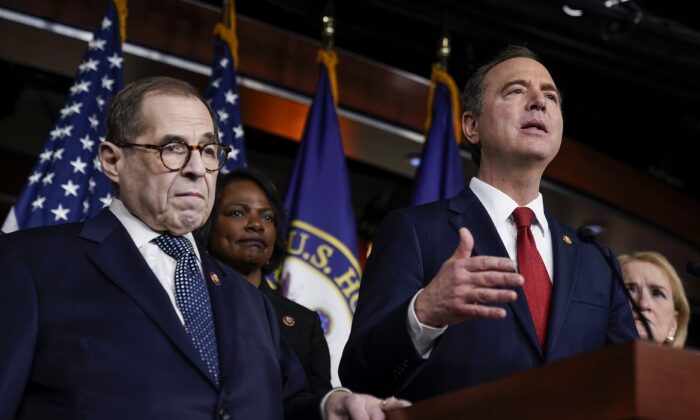The FTC has accused a former oil executive of colluding to keep prices high.
Democrats on the House Judiciary Committee have joined Senate Democrats’ calls for the Department of Justice (DOJ) to investigate claims of price-fixing in the oil industry.
Citing a recent Federal Trade Commission (FTC) complaint, a group of 10 committee members, led by Rep. Jerry Nadler (D-N.Y.), the committee’s top Democrat, urged Attorney General Merrick Garland and Assistant Attorney General for Antitrust Jonathan Kanter to probe allegations of collusion within the industry to keep prices up.
“By any measure, these are good times for oil companies in the United States,” the group of Democrats wrote in a June 4 letter.
They noted that last year, the two largest U.S. oil companies, Exxon Mobil and Chevron, earned their biggest annual profits in a decade.
“But apparently, instead of passing those profits through to consumers in the form of cheaper products, the oil giants have been lining their own pockets while conspiring to keep prices high,” the lawmakers wrote.
The FTC alleged last month that Scott Sheffield, former CEO of oil producer Pioneer Natural Resources, colluded with OPEC and OPEC+ to suppress oil and gas production, inflating consumer prices and his company’s profits.
The purported collusion was uncovered during an FTC investigation into Exxon’s $64.5 billion acquisition of Pioneer. The FTC ultimately approved the merger under the condition that Mr. Sheffield be barred from serving on Exxon’s board or in any advisory capacity.
While praising the FTC’s work, the congressmen said the commission’s findings raised additional questions that need to be answered.
“What else do we not know? How are foreign cartels and domestic conspiracies affecting the price of gas? What is the full impact on the American people?” they asked.
“While the Commission rightly barred Mr. Sheffield from serving on the board of the combined company as part of its review, the antitrust enforcement authorities must immediately open full investigations into this illegal scheme. Because DOJ has sole authority for criminal antitrust enforcement, your Department must take the lead in this effort.”
The congressmen asked that Mr. Garland and Mr. Kanter contact Judiciary Committee staff to set up a briefing on the matter.
The House Democrats’ call for action echoed that of the 22 Senate Democrats who last week made the same request.
“Corporate malfeasance must be confronted, or it will proliferate,” the senators, led by Senate Majority Leader Chuck Schumer (D-N.Y.), wrote in a May 30 letter.
“The DOJ must protect consumers, small businesses, and the public from petroleum-market collusion, and an important part of that mission means seeking full restitution and imposing all penalties supported by the facts and the law.”
The Justice Department did not respond to a request for comment by press time.
Mr. Sheffield has fiercely disputed the FTC’s allegations, asserting in a 23-page response that the FTC “unjustly smeared” him.“It also shows how publicly and unjustifiably vilifying me will have a chilling effect on the ability of business leaders in any sector of our economy to address shareholder demands and to exercise their constitutionally protected right to advocate for their industries,” Mr. Sheffield said.
President Joe Biden and other Democrats have frequently criticized the oil and gas sector, accusing companies of price-gouging. In October 2022, President Biden compared energy firms to war profiteers and suggested that he might implement a windfall tax.
“Oil companies’ record profits today are not because of doing something new or innovative,” the president said in prepared remarks. “Their profits are a windfall of war, a windfall for the brutal conflict that’s ravaging Ukraine and hurting tens of millions of people around the globe.”
However, Republicans have pointed to the president’s policies as the source of high oil and gas prices.
Over the weekend, OPEC+ laid out its plan to increase oil production later this year, which should help drive prices down. At a June 2 meeting, OPEC+ nations decided to gradually phase out voluntary production cuts of 2.2 million barrels per day—which were announced in November 2023—over a 12-month period starting in October.
The market wasn’t happy with the move. It resulted in a sell-off at the start of the week before prices began to bounce back on June 5.
Andrew Moran and Naveen Athrappully contributed to this report.

